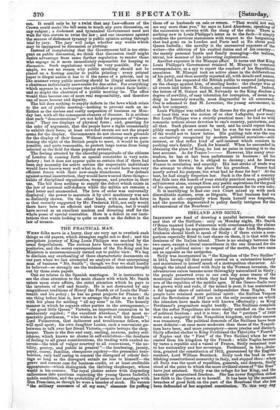THE PRACTICAL MAN.
Wnzif folks move in a hurry, they are very apt to overlook such things as old papers, which strangers ought not to find ; and the precipitate journey of King Louis Philippe was marked by the usual forgetfulness. The curious have been ransacking his re- positories, and the secret correspondence of the Ex-King and his Ministers is unceremoniously turned out to public view. We beg to disclaim any overhauling of these characteristic documents on our part when we last attempted an analysis of that enterprising man of business " Mr. Smith"; though we fear we shall hardly be believed—so strongly are the tradesmanlike incidents brought out by these state papers.
One set relates to the Spanish marriages. It is instructive to see the close attention to the main chance with which Mr. Smith enters upon state affairs, the strict attention which he pays to the interests of self and family. He is not distracted by any magnificent traditions of Henry the Fourth or of Louis the Four- teenth and his policy ; he has no great projects for France : the one thing before him is, how to arrange the affair so as to fall in with his plans for settling " all my sons " in life. The homely manner in which he regards other parties in the arrangement,— " our good little Queen " Victoria, an important connexion to be assiduously cajoled ; " the excellent Aberdeen," that most re- spectable gentleman, " who wishes to be well with his friends " ; Lord Palmerston, that indiscreet and troublesome fellow, who will spoil sport; his own daughter Louise, such a convenient go- between to talk over her friend Victoria,—quite betrays the shop- keeper. There is the free and easy, smiling, anxious, paltry self- ishness, which knows no shame in self-exhibition—the deadness of feeling to all great considerations, the trading with exalted in- terests—the trick of vulgar courtesy to all connexions, " the no- bility, gentry, and public in general "—the lumbering, jaunty, pursy, coarse, familiar, obsequious cajolery—the pretended bene- volence, only half caring to conceal the disregard of others' feel- ings so long as the disregard entails no loss to himself—the grave and earnest care for business credit, or at least creditable appearances—which distinguish the thriving shopkeeper, whose world is his counter. The royal plotter enters with disgusting callousness into questions respecting the young Queen Isabella's nubile condition, and the probability of issue on her marriage with Don Francisco, as though he were a breeder of stock. He vaunts "the military successes of all my sons," elements for puffing them off as husbands on sale or return. "That would not suit me any more than you," he says to Lord Aberdeen, speaking of the succession to crowns with the slang of the shop. There is nothing new in Louis Philippe's letter as to the facts—it simply confirms the previous statements with respect to the bargaining that had gone on in London and Paris and at Eu about poor Queen Isabella : the novelty is the unreserved exposure of the writer—the oblivion of his exalted duties and of his country—. the merely personal bustle and family managing—the tedious, trivial, low manner of his palavering explanations. Another exposure is the Blanqui affair. It turns out that King Louis Philippe's Government retained M. Blanqui in constant correspondence, as a spy to report the conduct of his Republican associates. M. Blanqui took an active share in the deliberations of his party, and then secretly reported all, with details and names. M. Libri has requested the British public to suspend judgment on the charge against him, of stealing books : the charge was at all events laid before M. Guizot, and remained unsifted. Indeed, the letters of M. Guizot and M. Salvandy to the King disclose a degree of servility, of easy toleration for corruption, of mean tra- ding in honorary rewards, most disgraceful to all concerned. One is ashamed to find M. Leverrier, the young astronomer, in such low company. Louis Philippe was called to the throne for the good of France —at least this was the notion of ce cher Lafayette, poor soul! But Louis Philippe was a strictly practical man : he had no wild romantic notions about devotion to one's country, patriotism, and all that. Such phrases must be used, and he could repeat them glibly enough on set occasion ; but he was far too much a man of the world not to know better. His guiding rule was the one so exclusively recognized by modern political moralists—self- interest, or that reflex kind of self-interest which consists in pushing one's family. Each for himself. When he succeeded in obtaining the place of King, he lost no pains in turning it to the best account. As for France! However, like many over- traders, he has at last been unfortunate in business : all his schemes are blown ; he is obliged to decamp ; and he leaves France to revolution and anarchy. His last stroke of trade was the attempt to obtain the place for his grandson. France had nearly served his purpose, but what had he done for her ? At the best, he had simply forgotten her. Such is the fate of a country that falls into the hands of your strictly practical man, guided by self-interest alone, exempt from any poetic aspirations for the good of his species, or any generous love of greatness for its own sake.
It is mortifying to find our own Court mixed up with such discreditable matters, even as litigants. What business had we in Spain at all—especially when Spain herself was forgotten, and the question degenerated to paltry family intrigues for the advancement of the Bourbons ?


























 Previous page
Previous page